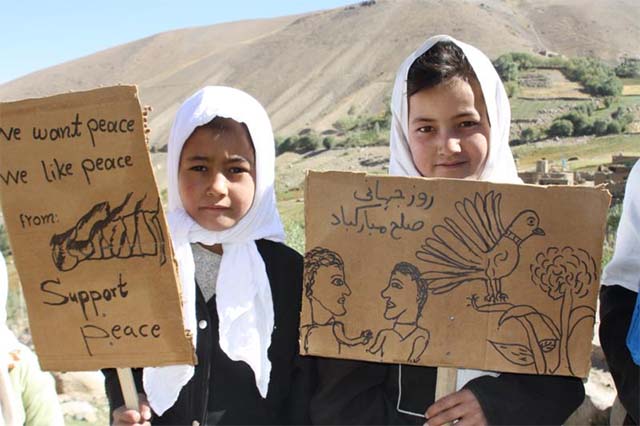In spite of long time struggles for peace in Afghanistan, they have frequently failed in the country. However, there is no more beautiful word than peace for bereaved Afghan people. Each and every Afghan citizen wishes a day that their children go to educations without fear of dead and explosions while eagerly dreaming to revive their lost dignity beside other prosperous world countries. So everyone needs peace and wholeheartedly wants to reach it here.
Peace building needs certain social institutions to be built or improved to create a conducive condition for a peaceful life in any society. Thus, the government shall develop a comprehensive policy for peace building in the concerned society. The first peace component is being inclusive otherwise it may cause dissatisfactions and ultimately extension to armed conflicts. So, peace program neither could be confined to mere negotiations with a certain armed party and nor could be designed or decided by certain circles. As the armed conflicts are watered by various social and political motives, they must be thoroughly analyzed and taken to consideration.
In the other words, to get pervasive tranquility and trust it requires to pave the way for all its necessary social, cultural and political ground. As Afghanistan is a country with background of autocratic political systems, one of the main factors for intensification of internal crises has been the social and political inequality against certain racial and religious groups. Eliminations of these issues are not feasible except through establishment of genuine justice system, civil rights guarantee and elimination of all forms of discriminations. Hence, any peace programs which do not have its origin in multitudes and social justice will not led to integration of armed groups and national coexistence.
The second component of peace building is having equal economic development programs so that all citizens benefit from opportunities and believe in new political chapter. It is highly important that new generation of Afghanistan deeply believe that social justice and meritocracy are an underlying principle for peaceful and prosperous life within and among nations. We uphold the principles of real peace when we promote rights of minority groups, gender equality, children and other vulnerable people. Accordingly, we cannot become one unless we remove all barriers that people face because of gender, age, race, ethnicity, religion, culture or disability. People should also play role in electing good leaders by voting on the basis of ones’ patriotic commitment, meritocracy and past profile. they have to be aware to vote for leaders who believe in peace, unity and democratic values.
Meanwhile, peace building is a national process and will have an impact on the fate of all citizens; therefore, it needs national legitimacy. National legitimacy will come about when there is a consensus on the peace agenda and strategies to reach it. The general consensus can be obtained through national dialogue while letting people know the criteria and conditions of negotiations. What is the purpose of the peace plan? Will this program have a political future for the citizens? What makes the program good for every citizen? When this awareness among people is institutionalized through information tools and social audiences, people will be able to shape their views. Peacemakers are then required to launch surveys and examine the views, perceptions and concerns of citizens in their national affairs. Clearly, these programs should be designed in a step-by-step peace plan and then presented to people. In such a case, the peace plan will receive widespread supports and cooperation from the people. In the context of Afghanistan, we also need regional and trans-regional consensus. Identifying the deterrent regional and international peace factors and paying respect to their legitimate interests will make a better road to peace process.
The other important component of suitable peace building is protecting the fundamental rights and freedoms of citizens - especially the vulnerable. Peace without justice and political and civil liberties leads to tyranny and autocracy. Security in its broadest sense is not only subject to physical security but also includes personal, social and economic security. Therefore, the most important challenge to the Afghan peace plan is to protect the civil and political rights and freedoms of Afghan citizens who have paid a great price to achieve these rights and freedoms and are not willing to put these values into bargains. On the other hand, reconciling the victims of the disputed conflicts is an integral part of any peace and reconciliation agenda. Restoring war victims and creating a common understanding of the plagues and tragedies of various social groups and groups will weaken the spirit of retaliation and reversely strengthen the culture of tolerance and interdependence.
Finally, there some other tools and components which are essential for generalization peace culture and the development of the spirit of peace in the community; these can include the establishment of beneficial educational programs, the extension of the rule of law, elimination of administrative corruptions and impartial investigations on important warfare cases that take longer time.
National ownership of the peace process is one the most important building blocks of a peace building process in any country. Also, the peace building process shall ensure the rights of all the citizens. More importantly, the government shall make effort efforts to develop an enabling environment for shaping the culture of peaceful life in the society. Only, such a culture can ensure the sustainable peace and prosperity in our country.
Home » Opinion » A glance at peace process in Afghanistan
A glance at peace process in Afghanistan
| Mohammad Zahir Akbari

